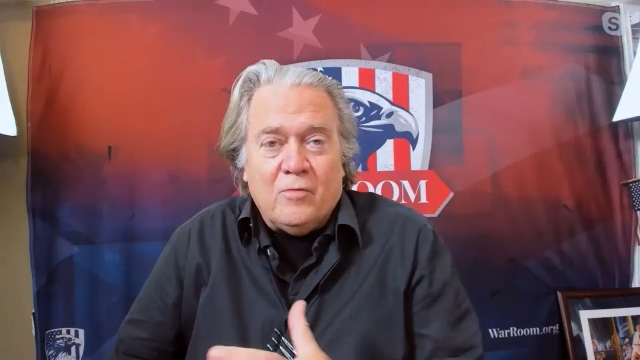- Conservative icons Steve Bannon and Mark Levin erupt in social media feud over U.S. involvement in Israel-Iran conflict.
- Bannon denounces Levin as a “Tel Aviv spokesperson” opposing military escalation, while Levin brands him a “fraud” for opposing Trump’s policies.
- Feud highlights growing divide within the MAGA movement between populist anti-war advocates and neoconservative hawks.
- Critics warn the clash mirrors past hawkish failures like Iraq, urging “America First” focus over foreign entanglements.
- Polls show public skepticism of foreign wars as political tensions over foreign policy risk fracturing the Republican base.
What began as a policy disagreement over U.S. military intervention in the Middle East has exploded into a full-scale feud between two of conservative media’s most influential voices. Steve Bannon, a central architect of Donald Trump’s rise, and Mark Levin, the Fox News legal analyst famous for his hawkish rhetoric, traded insults and accusations of foreign allegiance this week in a clash that underscores deepening rifts within the Republican Party.
The dispute centers on whether the U.S. should escalate its involvement in Israel’s bombing campaign against Iran’s nuclear infrastructure. Bannon warns against another “endless war,” while Levin insists America must “stand with Israel.” The feud has drawn in President Trump, whose foreign policy now faces simultaneous endorsement and criticism from his former allies.
Roots of the conflict: Neocon hawks vs. populist skeptics
Bannon and Levin’s spat is the latest chapter in a long-simmering debate over the GOP’s foreign policy direction. Bannon, who once aligned with Trump’s “America First” ethos, argues that supporting military action against Iran—based on allegedly flawed intelligence—mirrors the 2003 Iraq War mistakes. “These jackals feed off death and destruction,” Bannon said on Monday’s War Room show, accusing Levin of prioritizing Israel’s agenda over U.S. interests.
Levin, a vocal supporter of Israeli military action, countered by calling Bannon “a disgusting fraud” and an enemy of national security. “80% of Americans backed the operation to destroy Iran’s nukes. You gave aide and comfort to the enemy,” he wrote on X, referencing public support for recent strikes against Iranian facilities.
The divide reflects broader tensions. Populist conservatives see U.S. entanglement in Middle East conflicts as fiscal, diplomatic and moral drains, while neoconservatives like Levin view robust support for Israel — long a cornerstone of bipartisan alliances — as critical to global security.
Bannon’s legal baggage fuels his critics’ attacks
Levin’s attacks are amplified by Bannon’s recent legal troubles. In early 2025, Bannon pleaded guilty to defrauding donors funding Trump’s border wall project, earning a conditional discharge. He also served jail time in 2024 for defying a House subpoena linked to the Jan. 6 Capitol riot. Levin invoked both scandals in his Twitter tirade, declaring, “You cheated how many people?” and mocking Trump’s 2023 pardon of Bannon — a move Levin now calls hypocrisy.
Bannon retorted that Levin’s hostility stemmed from frustration over failed war narratives. “Why are Tel Aviv Levin and these guys so apoplectic? We defeated them,” he said, accusing Fox News of acting as “a propaganda arm for a foreign government.”
A fractured base and its consequences for 2024 and beyond
The feud has resonated with Trump’s base, many of whom enacted “regime change fatigue” after the Afghanistan withdrawal and ongoing Ukrainian conflict’s high death toll. A Revolver report cited “war-weariness” among conservatives, with one poll showing 62% of Republicans oppose direct U.S. military intervention in Iran.
Critics like former Never Trumper-turned populist Grace Chong argue Levin’s stance aligns with establishment figures who “baited American presidents into foreign quagmires.” “Levin’s priorities are not America First — they’re Tel Aviv First,” she said, noting his reversal after opposing Trump’s 2016 campaign.
Yet Levin insists intervention is non-negotiable. “Iran won’t surrender,” he told Fox, warning that China’s military support for Tehran necessitates a robust response.
Can conservatives unite on foreign policy?
The feud risks alienating factions key to Trump’s 2024 re-election: pro-Israel supporters at the American Israel Public Affairs Committee (AIPAC) versus MAGA anti-war activists. Former National Security Adviser Gen. Michael Flynn, appearing on Bannon’s show, urged the White House to “stop kowtowing to Netanyahu.” Meanwhile, Levin accused Flynn’s camp of doublespeak, claiming that not all opposition to aid is “patriotic.”
Historians note parallels to Cold War-era splits between realists and neocons. “This isn’t just about Iran — it’s about how conservatives define their values moving forward,” said Prof. John Mearsheimer of the University of Chicago. “The American right has always been a noisy coalition, but this is existential.”
The GOP’s identity crisis at a crossroads
As Bannon and Levin traded insults this week, one question looms: Can the Republican Party reconcile its traditional “strength through caution” pragmatism with its new era of populist foreign skepticism?
For now, the war of words continues — both in public squares and on the front lines of American diplomacy. But as the Right’s old guard fades, its next generation faces a pivotal choice: whether to repeat the mistakes of its predecessors or forge a new path unburdened by foreign siren songs.
Sources for this article include:
Revolver.news
Yahoo.com
Read full article here


